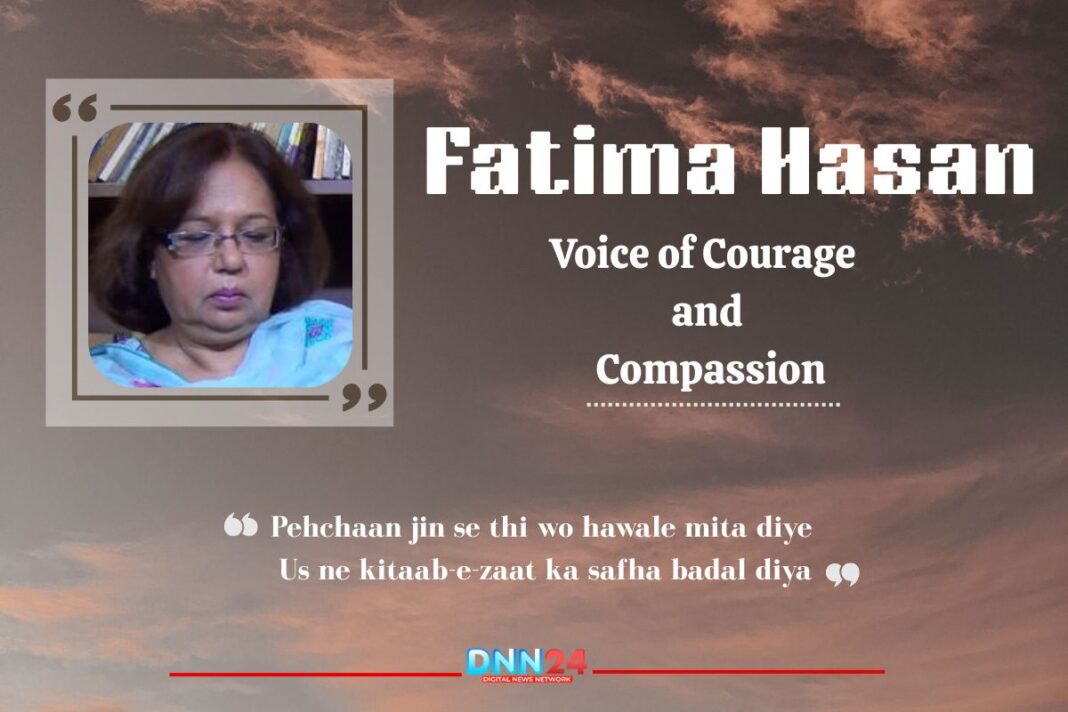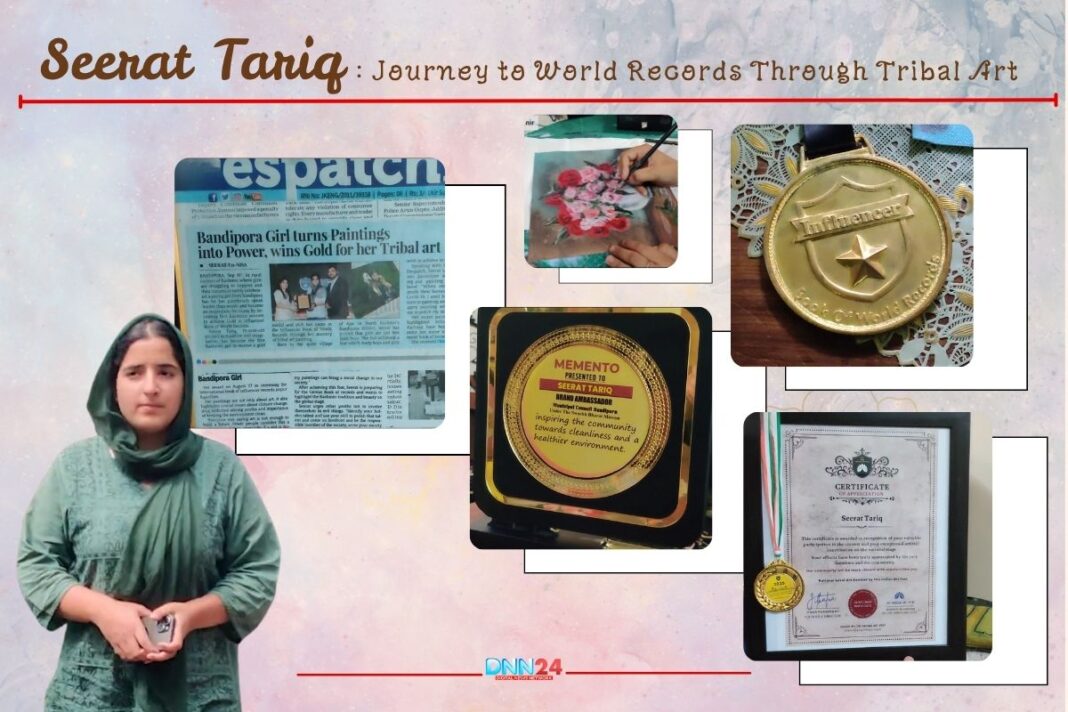Born on January 24, 1953, in Karachi, Fatima Hasan grew up in a world reshaped by migration and memory. Her parents, Syed Tahzibul Hasan and Sayyeda Kaniz Fatima, had travelled from Ghazipur, India, after the partition of 1947. The pain and hope of that journey lingered quietly in their household, forming the first rhythm of Fatima’s thoughts.
Kya kahun us se ki jo baat samajhta hi nahin
Fatima Hasan
Wo to milne ko mulaqat samajhta hi nahin
As a child, she was not drawn to toys or games like others. Instead, she found companionship in books, verses, and silence. In her school diary, she often copied couplets of Mirza Ghalib, but not merely as a student learning poetry. For her, those lines became secret dialogues with her own feelings, questions she was too young to ask aloud.
Khwabon par ikhtiyar na yadon pe zor hai
Fatima Hasan
Kab zindagi guzari hai apne hisaab mein
When her family moved to East Pakistan, Fatima was a teenager trying to understand identity, belonging, and loss. The fall of Dhaka tore her world apart. Her family had to move once again, this time to Karachi, where she began a new life amid the ruins of the old. Yet in this shifting landscape, poetry became her only constant. She would often say that writing was not her decision; it was her way of breathing through pain. The images she later created in her poems of broken homes, refugee mothers, and quiet women rebuilding their worlds came from these early wounds.
Sukoon-e-dil ke liye ishq to bahaana tha
Fatima Hasan
Vagarna thak ke kahin to thahar hi jaana tha
Her childhood experiences shaped her voice into one that could speak of both strength and sorrow. When she wrote, she wrote with purpose. Her verses were not built for fame; they were created to carry feelings that ordinary speech could not. Through her words, Fatima Hasan found not just expression but existence. Even today, her early poems stand as a mirror to her youth, a time when every word she wrote carried the fragrance of Karachi’s air and the silence of lost homelands.
Main ne maan ka libaas jab pehna
Fatima Hasan
Mujh ko titli ne apne rang diye
The Journey from Words to Wings
Fatima Hasan’s life was never cushioned by comfort, yet courage was always her companion. After completing her higher studies, she pursued a PhD in Mass Communication, a rare achievement for women in her time. In 1977, she began working in Pakistan’s Information Department. The job brought her face-to-face with stories of inequality, injustice, and endurance, the very themes that would later shape her poetry.
Uljh ke reh gaye chehre meri nigahon mein
Fatima Hasan
Kuch itni tezi se badle the unki baat ke rang
Her collections, such as Dastak Se Dar Tak Ka Fasla, Khamoshi Ki Awaz, and Kahaniyan Gum Ho Jati Hain, became reflections of her understanding that silence, too, has a voice. Once, in an interview, she said, “Khamoshiyon ki apni bhi taseer hoti hai.” Her words carried the depth of someone who had lived through many kinds of quiet, social, emotional, and spiritual experiences. Fatima’s poetry does not depend on ornamented language. Instead, it walks barefoot through truth and tenderness. Each verse feels like a soft step on burning ground, honest and unadorned yet intensely human.
Aankhon mein na zulfon mein na rukhsaaar mein dekhein
Fatima Hasan
Mujh ko meri daanish mere afkaar mein dekhein
Though she rose to senior positions and eventually retired as the Director of Public Relations, her true identity was always her pen. At home, her husband, Shaukat Ali Zaidi, and her daughter encouraged her creative pursuits. They provided her with the space to weave her emotions into words. Many of her poems written during this period carry a dual tone, domestic calm layered with internal chaos.
Kitne achchhe log the kya raunaqen thin unke saath
Fatima Hasan
Jin ki rukhsat ne hamara shahr soona kar diya
Her journey from the narrow corridors of bureaucracy to the open arenas of literature was not a leap of ambition but a flight of purpose. She did not just write poems; she built bridges between pain and peace. Her art was her way of making sense of life, turning daily struggles into something meaningful, almost sacred. For readers, her poetry became both a mirror and a refuge, where human emotions were honoured, not hidden.
Dikhai deta hai jo kuch kahin wo khwab na ho
Fatima Hasan
Jo sun rahi hoon wo dhoka na ho sama’at ka
The Rebel of Silent Stories
Fatima Hasan never declared herself a feminist, yet her writing speaks more powerfully than slogans ever could. She became a voice for women whose stories were lost between tradition and time. Her works, such as Feminism Aur Hum and Urdu Shayari Mein Aurat Ka Shaoor, are not just literary explorations but heartfelt confessions. They capture what it means to be a woman in societies that demand silence from those who feel deeply.
Bahut gahri hai uski khamoshi bhi
Fatima Hasan
Main apne qad ko chhota paa rahi hoon
Her writing refuses to portray women as fragile beings. Instead, she paints them as survivors, strong, intuitive, and aware. Through her essays and stories, she gave identity to voices that history often ignored. Her study, Balochistan Ka Adab Aur Khawateen, paid tribute to rural women who carried the weight of both home and hardship. She wrote about them not as distant subjects but as living embodiments of resilience.
Bichhad raha tha magar mud ke dekhta bhi raha
Fatima Hasan
Main muskurati rahi main ne bhi kamaal kiya
Fatima often recalled her days in East Pakistan, where she had seen young girls writing poetry during wartime on scraps of paper, hiding them like treasures. They became symbols of silent courage in her imagination. In her later works, these girls reappeared as metaphors, proof that even in chaos, creativity survives.
Koi nahin hai mere jaisa chaaron aur
Fatima Hasan
Apne gird ek bheed saja kar tanha hoon
Her presence at literary gatherings was quiet but commanding. She did not seek the spotlight, yet her words always found it. When someone once asked why her poems carried such sadness, she smiled and replied, “Because silence sometimes dresses in sadness to be noticed.” That answer revealed the heart of her art, compassion wrapped in calm. Through her work, Fatima Hasan taught that rebellion does not always roar. Sometimes, it whispers, and those whispers can move mountains.
Us ke piyale mein zahr hai ki sharaab
Fatima Hasan
Kaise maaloom ho baghair piye
The Legacy of Light and Loneliness
Over time, Fatima Hasan’s poetry evolved, shifting from personal sorrow to universal reflection. Her later collections, such as Yad Ki Barishen and Yaden Bhi Ab Khwab Hain, explore memory not as nostalgia, but as a living presence. She captures how memories evolve, how they shift shape with age, and how they linger in the smallest corners of our days.
Hamari nasl sanwarti hai dekh kar ham ko
Fatima Hasan
So apne aap ko shaffaf-tar bhi rakhna hai
Her writing reflects a balance between light and shadow, presence and absence. She understood that beauty often lies in restraint. Critics such as Professor Karrar Hussain and Qamar Jamil admired her ability to express vast emotions through simple words. In her verses, every image breathes, rain becomes remembrance, silence becomes a story, and love becomes prayer.
Sunti rahi main sab ke dukh khamoshi se
Fatima Hasan
Kis ka dukh tha mere jaisa bhool gayi
Even in her later years, Fatima Hasan continued to inspire new generations as the Dean of a literary institute in Karachi. She taught poetry not as a set of theories, but as a way of living consciously. Her students often said she did not teach them to analyse poems but to feel them, to listen to the pauses, to sense the emotions behind each word.
Poori na adhoori hoon na kam-tar hoon na bartar
Fatima Hasan
Insaan hoon insaan ke meyaar mein dekhein
Her legacy extends not only to her published books but also to the countless minds she touched. Fatima Hasan’s journey from a displaced child to a celebrated poetess is a tale of endurance, empathy, and evolution. Her life reminds us that art is born from honesty, not perfection. She proved that words can heal where silence wounds, that truth, however painful, is the most beautiful language of all.Her poetry remains timeless, a gentle reminder that courage need not shout to be heard. Sometimes, it just needs to be written.
Raat dariche tak aakar ruk jaati hai
Fatima Hasan
Band aankhon mein uska chehra rehta hai
Conclusion
Fatima Hasan’s story is one of grace woven through struggle. She turned personal grief into art, giving voice to those who could not speak. Her journey shows that strength is not the absence of pain, but the ability to rise through it. Every poem she wrote carries a part of her truth, and through that truth, she continues to live. Fatima Hasan remains not just a poet of words, but a poet of humanity. Her voice, gentle yet powerful, will echo as long as poetry exists.
Also Read: Saghar Siddiqui: Footpath Emperor Whose Poetry Echoed Pain and Love
You can connect with DNN24 on Facebook, Twitter, and Instagram and subscribe to our YouTube channel.



